Trump’s 51st State Rhetoric Sparks Nationalism and Reshapes a Federal Election in Canada
In an extraordinary twist of geopolitics and populism, President Donald Trump’s escalating rhetoric about Canada’s dependence on the United States has backfired — not in Washington, but in Ottawa. What began as provocative statements about tariffs and national defense has snowballed into a political reckoning that could reshape Canada’s leadership. As Canadians brace for their federal election, Trump’s claims that Canada would “cease to exist” without U.S. support have stirred an unprecedented wave of nationalism, catalyzing a dramatic comeback for the embattled Liberal Party under new Prime Minister Mark Carney.
The “51st State” Narrative: Provocation or Strategic Pressure?
In what many observers have called the most diplomatically aggressive U.S. posture toward Canada in decades, President Trump has revived and amplified a narrative that casts Canada as economically subordinate and politically fragile. During an Oval Office signing ceremony, Trump asserted that Canada would not survive without the United States — a remark that reverberated across North America just days before the Canadian federal election.
This claim followed a string of previous suggestions that Canada should consider becoming the “51st state”, a notion Trump reportedly first floated during discussions with former Prime Minister Justin Trudeau. According to Secretary of State Marco Rubio, Trump suggested statehood as an “economic solution” amid growing tensions over U.S.-imposed tariffs.
Though Trump moderated his rhetoric briefly following conversations with Prime Minister Mark Carney, the White House quickly reaffirmed his views. Press Secretary Karoline Leavitt emphasized that Trump believes the U.S. subsidizes Canada’s defense and that Canadians would be better off under American governance — promising “much lower taxes” and “no tariffs.”
Mark Carney’s Political Ascendancy: Sovereignty as a Campaign Weapon
Few political stories rival the meteoric rise of Mark Carney in early 2025. Appointed Prime Minister in March following Trudeau’s resignation, Carney inherited a fractured Liberal Party and an election forecast that painted a grim picture: a 27-point deficit against the Conservatives.
But Trump’s verbal barrage may have handed Carney an electoral gift.
Carney reframed his campaign around Canadian sovereignty, Arctic security, and economic independence — themes that resonate strongly with voters feeling insulted and threatened. He pledged C$30.9 billion in new defense spending by 2030 to meet NATO's 2% GDP target, with particular emphasis on militarizing the North to counter U.S. and Chinese influence in the Arctic.
On the economic front, Carney’s plan includes:
Dismantling internal trade barriers between provinces to boost domestic commerce.
Providing support to industries hit by U.S. tariffs, including manufacturing and energy.
Pursuing diversified trade deals with the EU and Asia to reduce U.S. dependency.
Implementing a middle-class tax cut, giving up to $825 annually to dual-income households.
These policy points have re-energized the Liberal base and drawn support from disaffected centrists. As Carney himself told Quebec voters, “The question is who will negotiate with Trump — it’s going to be us.”
The U.S.–Canada Trade War: Tariffs as Political Fuel
The Trump administration’s decision to levy sweeping tariffs on Canadian goods in 2025 — including a 25% tariff on most imports and 10% on energy products — ignited a retaliatory firestorm. Canada responded with 25% tariffs on US$22 billion worth of American exports, targeting swing-state goods like dairy, auto parts, and whiskey.
This bilateral trade conflict marks a historic turning point:
Ontario temporarily imposed a 25% electricity surcharge on U.S. border states, signaling Canada’s readiness to weaponize energy policy.
Carney declared an end to the era of deep economic and security integration, calling for a more assertive and autonomous Canadian foreign policy.
Public opinion surveys now show that 25% of Canadians consider the U.S. an enemy, while favorable views of America have plummeted to 39%, compared to 81% in 1995.
The trade war hasn’t just altered economic relations — it’s reshaped Canada’s political landscape. Once expected to coast to victory, the Conservative Party has seen its commanding lead vanish, partially due to its perceived ambivalence toward Trump’s aggression.
Nationalism as the Unexpected Winner
While Trump may have intended to pressure Canada into economic submission, his approach has instead awakened a potent sense of national pride and urgency among Canadian voters. This is a rare instance where foreign rhetoric has played a decisive domestic role in a neighboring country's election — not by intimidating the populace, but by galvanizing it.
Carney’s campaign slogan, "Defend Canada, Build Our Future," encapsulates the emotional resonance of this moment. From coast to coast, Canadians have rallied behind a vision that asserts their country’s independence, both economically and militarily. The narrative has shifted from one of reaction to one of reaffirmation.
Strategic Takeaways for Investors and Policymakers
For investors and geopolitical analysts, this episode offers a cautionary tale about the unintended consequences of economic brinkmanship:
Tariff wars can strengthen opposition forces abroad, especially in democracies where public sentiment shifts quickly.
Nationalism remains a formidable political currency, particularly when sovereignty is perceived as being under threat.
Diversification strategies are becoming increasingly essential, as nations like Canada accelerate efforts to de-couple from single-market dependencies.
Those with stakes in North American trade and energy markets should monitor Canada’s evolving Arctic and defense policies, particularly if the Liberals secure a majority. Expect regulatory shifts, increased military spending, and possible renegotiations of cross-border energy infrastructure.
Conclusion: The Border Is More Than a Line
President Trump may view the U.S.–Canada border as “an artificial line,” but to millions of Canadians, it now marks a critical threshold between independence and annexation. His remarks, perhaps meant to dominate the headlines, have instead galvanized a political resurgence in Canada — one that reinforces national unity and reshapes its global posture.
Whether Mark Carney translates this momentum into a sustained mandate remains to be seen. But what’s already clear is that Canada’s future will not be written in Washington — it will be defended in Ottawa.
